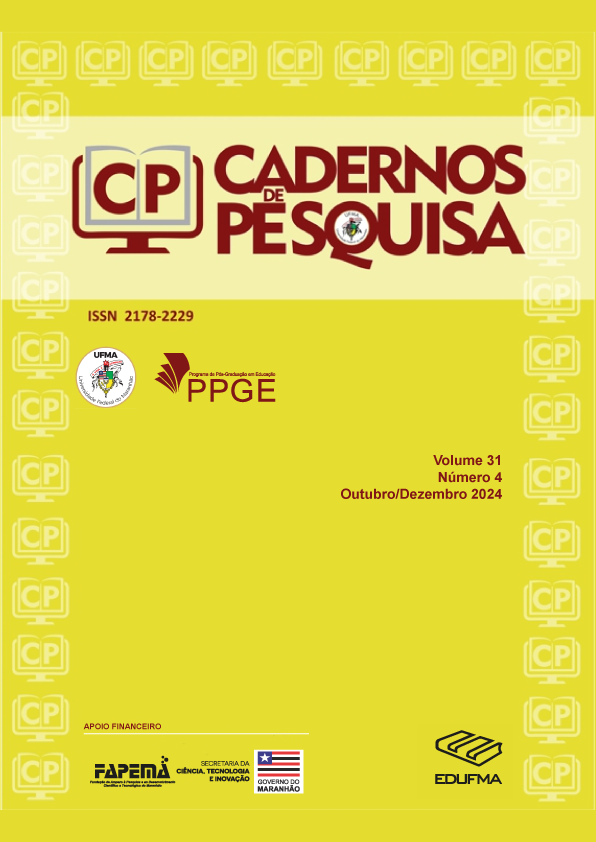Hygienist policy for children in Latin America: the cases of Argentina and Brazil in the 19th and 20th centuries
DOI:
https://doi.org/10.18764/2178-2229v31n4.2024.64Keywords:
Hygiene, Infancy, Argentina, BrazilAbstract
This article problematizes which hygienist policies were designed and innovative for childhood, at the end of the 19th century and beginning of the 20th, in Latin America (Argentina and Brazil)? The relevance of the object of study is justified by carrying out an investigation into an important topic in the field of the history of education and childhood, with the intention of revealing how hygienist thinking was shaped in the care and education of children in these representative countries. The objective of the article was to discuss hygienist policy for children in Latin America, especially in Argentina, in the city of Buenos Aires, and in Brazil, during the period in question, highlighting the actions and measures in the care and education of children at the end of the century. XIX and beginning of the XX. The methodology adopted was of a historical nature and of a bibliographic and documentary nature. The main documentary sources used were educational legislation, reports and educational printed materials, in the period from 1870 to 1925. An analysis of the sources made it possible to identify that the hygienist movement in Argentina and Brazil played an important role in combating infant mortality and the diseases that affected specific portion of the population. In the context of childhood, in two countries, doctors disseminated their precepts to families with guidance for mothers, as well as in the school context, through medical-sanitary inspections, which had the purpose of cleaning and moralizing the child's body in the direction of of forming a strong and healthy childhood to contribute to the progress and civility desired in the republican ideology.
Downloads
References
AIRES, J. R.; COSTA, R. B. da. As políticas de saúde do Pará na primeira República. Belém, PA: Imprensa Oficial do Estado do Pará, 2021.
ABREU JUNIOR, J. M. de C. O vírus e a cidade: rastro da gripe espanhola no cotidiano da cidade de Belém (1918). 1. ed. Belém, PA: Paka-tatu, 2018.
AISENSTEIN, A. y SCHARAGRODSKY, P. Tras las huellas de la Educación Física escolar.Cuerpo, género y pedagogía, 1880–1950. Buenos Aires: Editorial Prometeo, 2006.
ARANTES, E. M. M. Rostos de crianças no Brasil. In: RIZZINI, I; PILOTTI, (org.). A Arte de governar crianças: a história das políticas sociais, da legislação e da assistência à infância no Brasil. São Paulo: Cortez, 2011, p. 153-202.
ARMUS, D. “El descubrimiento de la enfermedad como problema social”. En M. Z. Lobato Zaida, Nueva Historia Argentina. El Progreso, la Modernización y sus Límites (1880 - 1916). Buenos Aires: Editorial Sudamericana, 2000, p. 507 - 552.
BARRANCOS, D. “Socialismo, higiene y profilaxis social, 1900-1930”. In: M. Z. Lobato, Política, médicos y enfermedades. Lecturas de Historia de la Salud en la Argentina. Buenos AiresBiblos, 1996, p. 117-149.
BARROS, J. D. História Comparada. Petrópolis: Vozes, 2014.
CAMAROTA, A. “Saberes médicos y medicalización del sistema escolar en Argentina (1924-1940)” Revista Pilquen. Universidad Nacional del Comahue, v. 3, n. 19, p. 33-51, 2016. Disponível em: https://revele.uncoma.edu.ar/index.php/Sociales/article/view/1417/pdf Acesso: 21 de ago. 2024.
CAMPOS, A. de. Noções Geraes de Hygiene. Belém: Livraria Escola, 1912.
CHASLES, V. Saúde urbana e higienismo, o exemplo da França. Revista Instituto. Revista do Instituto de Estudos Brasileiros [online], v. 1, n. 64, p. 65-74, ago. 2016. Disponível em: https://www.scielo.br/j/rieb/a/FdMsXrkmFc6y37tcdKGTgXv/?format=pdf&lang=pt Acesso: 20 de mar. 2024
CORBIN, A. El perfume o el miasma. El olfato y lo imaginario social. Siglos XVIII y XIX. Buenos Aires: FCE, 1987
CORRÊA, L. O caráter civilizatório das práticas higienistas no século XIX. p. 1-12. In: ENCUENTRO DE GÉOGRAFOS DA AMÉRICA LATINA, XIII, Anais (...), 25 a 29 de julho, Costa Rica, 2011.
COSTA, M. C. L. O Discurso Higienista Definindo a Cidade. Mercator, Fortaleza, v. 12, n. 29, p. 51-67, nov. 2013. Disponível: http://www.mercator.ufc.br/mercator/article/view/1226>. Acesso: 14 out. 2024.
DI LISCIA, M. S.; Salto, G. (ed.). Higienismo, educación y discurso en la Argentina (1870–1940). Santa Rosa: Editorial de la Universidad Nacional de La Pampa, 2004.
DI LISCIA, M.S.; Bohoslavsky, E. Las Políticas Sociales en Perspectiva Histórica. Argentina, 1870-1952. Buenos Aires: Prometeo, 2006.
DI LISCIA, S.Lionetti, L. (2021). Vacunación y viruela en la encrucijada del sistema educativo argentino (1884-1960). Revista Anales de la educación común. Buenos Aires, vol. 2, n. 1-2, p.15-34, mar. 2021.
El Monitor de la Educación Común. Organo del CNE. Buenos Aires: [s.l.]1905.
FARIAS FILHO, J. A.; ALVIM, A. T. B. Higienismo e forma urbana: uma biopolítica do território em evolução. Revista Brasileira de Gestão Urbana, [S. l.], v.1, n.14, p. 1-16, mar. 2022. Disponível em: https://periodicos.pucpr.br/Urbe/article/view/29618. Acesso em: 13 nov. 2024.
FREYRE, G. Casa-Grande & Senzala. 45. ed. Rio de Janeiro: Record, 2001.
GALAK, E. Educar los cuerpos al servicio de la política: Cultura física, higienismo y raza en Argentina y Brasil.Buenos Aires: Biblos, 2016.
GÓIS JUNIOR E; LOVISOLO H. R. Descontinuidades e continuidades do Movimento Higienista no Brasil do século XX. Revista Brasileira de Ciências do Esporte, [Online], n. 25, v. 1 p. 41-54, set, 2003. Disponível em: http://www.rbce.cbce.org.br/index.php/RBCE/article/view/172/181 Acesso: 28 set. 2024.
KOHL, A. Higienismo argentino: historia de una utopía – la salud en el imaginário colectivo de una época. Buenos Aires: Editorial Dunken. 2006.
KRAMER, S. A política do pré-escolar no Brasil: a arte do disfarce. São Paulo: Cortez, 2011.
LE BRETON, A. La antropología del cuerpo y modernidad. Buenos Aires, Ediciones Nueva Visión, 2002.
LEÃO, Acydino de. Hygiene Escolar. Revista do Ensino. Belém, v.1, n.12, p. 65-70, abr. 1912.
LIONETTI, L. “Discursos, representaciones y políticas educativas en torno a los ‘niños débiles’ en Argentina a comienzos del siglo XX” Espacios en Blanco. Revista de Educación, vol. 18, junio, p. 187-213, 2008. Disponívem em: https://host170.sedici.unlp.edu.ar/server/api/core/bitstreams/c7bdcded-fd5b-462f-aa49-8f8306dfccdf/content Acesso: 20 de set. 2024.
LIONETTI, L. La misión política de la escuela pública: la educación del ciudadano de la república. Buenos Aires/Madrid: Miño y Dávila. 2007.
LUZ, M. T. Medicina e ordem política brasileira: políticas e instituições de saúde (1850- 1930). Rio de Janeiro: Edições Graal, 1982.
MACHADO, R. et al. Danação da norma. Rio de Janeiro: Graal, 1978.
MARINHO, Inezil Pena. História Geral da Educação Física. São Paulo: Cia Brasil editora, 1980.
MERCANTE, V. La Paidología. Estudio del alumnos. Buenos Aires: M. Gleizer Editor, 1926.
MERLIN, P.; CHOAY, F. Dictionnaire de l’urbanisme e de l’aménagement. 4. ed. Paris: PUF, 2015.
MIRANDA, M.; VALLEJO, G. (comp.). Darwinismo social y eugenesia en el mundo latino. Buenos Aires: Siglo XXI, 2005.
PARÁ. Da Hygiene Escolar. A Escola: Revista de Ensino, Belém, n.1, p. 3-6, mai. 1900.
PARÁ. Regulamento Geral da Instrução Pública Primária. Decreto nº. 625 de 21 de julho de 1890. Belém: Tipografia do Diário Oficial, 1890.
PARÁ. Secretaria da Inspecção Sanitária. Relatório apresentado ao Secretário de Interior, Justiça e Instrução Pública, 30 de julho de 1910.
PINHEIRO, W. da C.; MATOS, L. S.; FERNANDES, R. O recreio no ensino primário e a educação dos corpos na infância (PARÁ, 1890-1918) . Revista Educação em Questão, [S. l.], v. 61, n. 67, p. 1-20, 2023. Disponível em: https://periodicos.ufrn.br/educacaoemquestao/article/view/3102. Acesso em: 13 jun. 2024.
PIRES, O. Hygiene no internatos. Revista de educação e ensino. Belém. v. 2, n. 2, p. 17- 18, fev. 1892.
PITA, V. Fiebre amarilla, habitaciones colectivas y disputas por derechos. In: ANDÚJAR, Andrea. Vivir con lo Justo: estudios de historia social del trabajo en perspectiva de género Argentina, siglos xix y xx. Buenos Aires: Prohistoria Ediciones, 2016.
PITA, V. Intromisiones municipales en tiempos de fiebre amarilla: Buenos Aires, 1871. Revista Historia y Justicia, 2006.
RIZZINI, I; PILOTTI, Francisco (org.). A arte de governar crianças: a história das políticas sociais, da legislação e da assistência à infância no Brasil. 2. ed. São Paulo: Cortez, 2009.
ROCHA, H. H. P. A escola como laboratório. In: BENCOSTTA, M. L. V. (Orgs.). Culturas escolares, saberes e práticas educativas: itinerários históricos. São Paulo: Cortez, 2007, p. 237-264.
RUSTOYBURU, C. La medicalización de la infancia. Florencio Escardó y la Nueva Pediatría en Buenos Aires. Buenos Aires: Biblos, 2019.
SARGES, M. de N. Belém: riquezas produzindo a Belle Époque (1870-1912). Belém: Paka – Tatu, 2010.
SOARES, C. L. Educação do corpo. In: GONZÁLEZ, F. J; FENSTERSEIFER, P. E. Dicionário Crítico de Educação Física. Ijuí: Unijuí, 2014.
SOARES, C. L. Educação Física: raízes europeias e Brasil. Campinas, SP: Autores Associados, 2007.
STEPAN, N. A Hora da Eugenia: raça, gênero e nação na América Latina. Rio de Janeiro: Fiocruz, 2005.
STEPHANOU, M. Discursos Médicos e a Educação Sanitária na Escola Brasileira. In: STEPHANOU, M; BASTOS, M. H. C. (org.). Histórias e memórias da educação no Brasil. Petrópolis: Vozes, 2005, p. 142-164.
TERÁN, O. Vida intelectual en el Buenos Aires fin desiglo (1880- 1910). Ed. FCE. Buenos Aires, 2000.
VENÂNCIO, R. P. Famílias Abandonadas: assistência à criança de camadas populares no Rio de Janeiro e em Salvador – Séculos XVIII e XIX. Campinas, São Paulo: Papirus, 1999.
VIÑAO FRAGO, A. Higiene, salud y educación en su perspectiva histórica. Areas, Murcia, v. 1, n. 20, p. 9-24, fev. 2000. Disponível: file:///C:/Users/user/Downloads/Dialnet HigieneSaludYEducacionEnSuPerspectivaHistorica-81400.pdf Acesso: 25 de Set. 2024.
ZIMMERMANN, E. Los intelectuales, las ciencias y el reformismo liberal: Argentina, 1890–1916. Desarrollo Económico.Buenos Aires, v. 31, n. 124, p. 545-564, jan-març. 1992. Disponível em: https://redbiblio.unne.edu.ar/pergamo/documento.php?ui=47&recno=159645&n=Desarrollo+Econ%C3%B3mico.+Revista+de+Ciencias+Sociales Acesso em: 10 de set. 2024.
Downloads
Published
How to Cite
Issue
Section
License

This work is licensed under a Creative Commons Attribution 4.0 International License.
A Cadernos de Pesquisa está licenciada com a Licença Creative Commons Atribuição 4.0 Internacional.



















